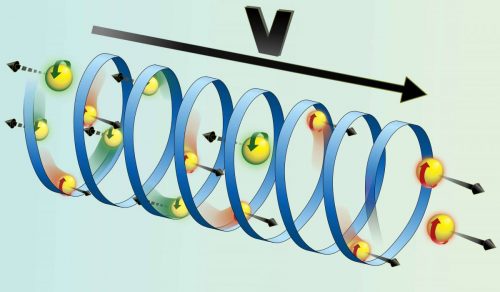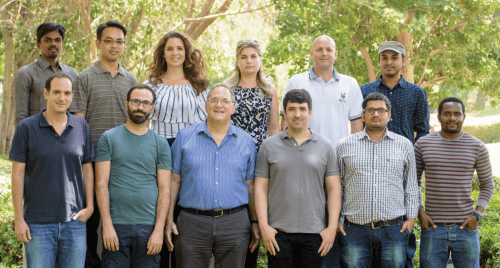Is it possible to create a "sieve" that sorts objects according to their direction of rotation? Scientists from the Weizmann Institute discovered that certain molecules prefer to transfer electrons with a certain spin direction, and thus can function as a kind of "filters". This discovery may have many applications - from the optimization of hydrogen production to the development of computer memory that will be based on the spin property of the electrons.

Is it possible to create a "sieve" that sorts objects - for example, electrons - according to the direction of their spin? It turns out that's exactly what they did Prof. Ron Naaman and members of his group in the chemical physics department of the Weizmann Institute of Science. This discovery may, in the future, lead to innovations such as reducing the production cost of hydrogen, and expanding the amount of information that can be stored on a hard drive.
The story of Prof. Naaman's current research begins with the chirality property of certain molecules: they appear in pairs that are identical in their composition but differ in the arrangement of their atoms in space, such as right-handed and left-handed, which are characterized by mirror-symmetry (the word chiral comes from the word "hand" in Greek). The proteins are built from amino acids, and are used in nature, among other things, to transfer electrons, in processes such as oxidation and photosynthesis.
In a previous study, Prof. Naaman's research group showed that DNA molecules, which are chiral, as well as peptides (consisting of a relatively small number of amino acids), more efficiently transfer electrons with spin (spin) in one direction, compared to electrons with spin opposite direction. In the current study, the scientists passed a stream of electrons with spins in both possible directions, through chiral biological molecules. In this way they discovered that these molecules, such as proteins, often prefer to transfer electrons with a certain spin direction. This is how these molecules can function as a "spin filter": they pass most of the electrons with a certain spin, and block the passage of most of the electrons with the opposite spin.

The scientists call the discovery the CISS effect, an acronym for Chiral Induced Spin Selectivity. The theory dealing with this effect was developed by Dr. Keren Michaeli from the Department of Condensed Matter Physics. "This phenomenon, spin filters, is usually created in ferromagnetic materials," says Prof. Naaman. "This is the first time it has been observed that chiral organic molecules that are not ferromagnetic can be used as spin filters."
The CISS phenomenon may have many future applications in a wide variety of fields, including the production of hydrogen from water and the development of a magnetic memory based on spintronics, that is, a memory that will be based on the spin property of the electrons, and not on their electrical charge. "Such memory devices," says Prof. Naaman, "already exist today, but those based on chiral molecules will be easier to produce, and they will consume less energy." This research was carried out in collaboration with the laboratory of Prof. Yossi Platiel from the Hebrew University.
Science books
Compared to the energy consumption of existing hydrogen production systems, the new method made it possible to reduce the energy consumption in the process of producing hydrogen from water in the laboratory by 30%.

One response
Spin filters will also be very useful for the old and new communication channels. I'm just afraid that after installing a quality spin filter, the Ynet site and a bunch of similar sites will just disappear.